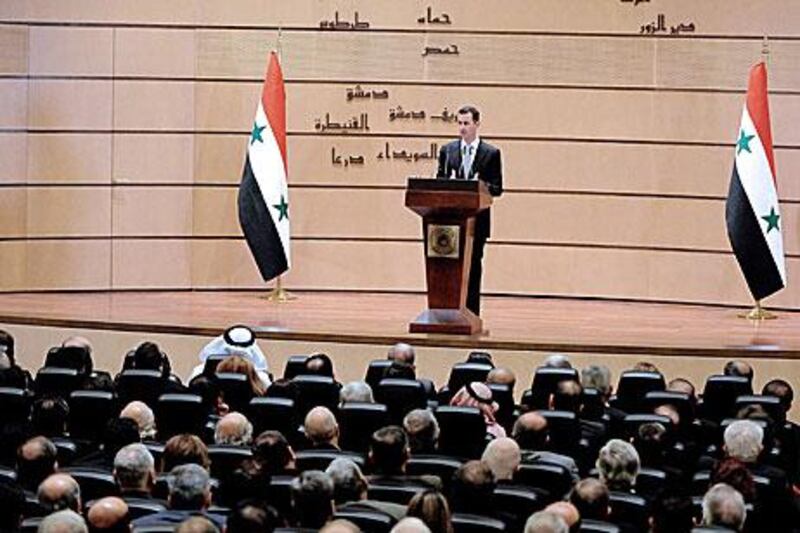DAMASCUS // Bashar Al Assad yesterday vowed to defeat his "terrorist" enemies with an iron fist and said political reforms were of limited use in solving Syria's deepening crisis.
In a live televised speech from Damascus University, his first direct address to the nation since June, the president was scathing of the Arab League, and the Gulf states, dismissed protesters as "a small minority" and "accomplices to terrorism" and assured his supporters that victory was close at hand.
There was an immediate response from demonstrators, who held rallies across the country calling for the president's overthrow, according to the Local Coordination Committees (LCC), an opposition network. The LCCs said at least 26 people were killed by security forces at the protests, including 14 in the eastern city of Deir Ezzor where dozens were also wounded.
"Our important priority now is to restore security which we have been enjoying for decades," Mr Al Assad said. "That cannot be achieved without striking with an iron fist against terrorism. We will not relent or be lax with this."
At the same time he repeated an assurance that security forces had not been given permission to shoot live ammunition at unarmed civilians.
"No one has the right to fire at any citizen unless in self-defence," he said, and any doing so would "not evade justice".
He brushed aside any suggestions a genuine grassroots revolution was under way, saying those involved stole cars, destroyed property, disrupted fuel supplies, burnt schools and killed innocent people.
"A revolutionary cannot be a thief," he said, later adding: "If they were true revolutionaries I myself, you and others would follow them."
Burhan Ghalioun, the head of the opposition Syrian National Council, called the speech "dangerous" and evidence of a "determination to use violence against our own people".
A long portion of the 100-minute address was devoted to the Arab League, whose observers are currently deployed in the country to monitor the regime's adherence to a peace plan that has failed to halt the violence.
Mr Al Assad said the league had failed to solve a single crisis in its history and, having suspended Syria's membership and imposed economic sanctions against Damascus, could no longer be considered an Arab organisation.
"Has the Arab League ever restored one olive tree uprooted by Israel … has it fed a hungry person in Somalia?" he said.
Mr Al Assad then launched an attack on the Gulf states the regime considers to be pushing an anti-Assad campaign. He said they had "no tradition, no history" of democracy and that "money cannot create civilisation".
On political reforms, Mr Al Assad defended his record. The cancellation of martial law and new legislation covering political parties, the media and elections were "tangible results" of his modernisation plans, he said.
A new constitution, currently being drafted, could be put to a national referendum in March he said, with parliamentary elections to follow in May.
In his June address - when the death toll from the uprising stood at 1,300, according to the United Nations - the president had promised all reforms would be complete by last September. In a subsequent interview with state-run television in August - the death toll then stood at about 2,000 - he said parliamentary elections would take place in February.
Yesterday he acknowledged the change of dates, saying it was more important to get the reforms right than to push them through too quickly.
According to the UN's most recent count, more than 5,000 civilians and defecting soldiers have now been killed. The Syrian authorities reject that figure, and say more than 2,000 security personnel have been killed by "armed gangs".
In advance of the speech there had been some speculation in Syria that a national unity government would be announced, involving opposition groups. Mr Al Assad said there was no need, with such coalition governments only necessary in countries in which there were divisions or civil war.
"We have no national divisions, we have differences but not divisions at the level that requires a national unity government," he said, and those differences would be "settled at the ballot box".
However no mention was made of any presidential election and the Syrian leader explicitly rejected the notion that sweeping political reforms would steer the country out of its crisis. "Reform cannot prevent terrorism," he said.
Opposition figures would be welcome to join future administrations, Mr Al Assad said, and he promised an on-going national dialogue, yet he questioned their legitimacy, contrasting it with his own.
"What is the opposition? Any person can claim to be opposition, I have met some and I ask them, 'who do you represent?'," he said. Earlier he said he remained president through popular consent: "I'm holding this position by the support of the people and when I leave it will be by the will of the people."
In his opening remarks, Mr Al Assad talked in detail about a "foreign plot" to destroy "pure independent" Arab identity, and of the "dark designs" of media organisations trying to unseat him.
Referring to a televised interview conducted with the American ABC network in which he said he was not responsible for the army, Mr Al Assad said it was evidence of the West's sophisticated lies, insisting he had said no such thing. "I am not someone who abandons responsibility," he said.
After the speech, members of the invited audience stood and chanted their willingness to sacrifice their blood and souls for the president, as he moved among them shaking hands, waving and smiling.
"These past 10 months, despite all their hardships, were very beneficial … I am confident about the future," he had told them.
psands@thenational.ae





